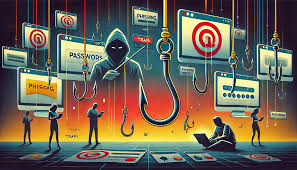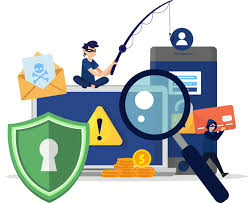In a revealing study conducted by KnowBe4, a staggering 46% of IT decision-makers in Singapore admitted to having difficulty distinguishing legitimate emails from phishing scams. This statistic paints a troubling picture of the current cybersecurity landscape, where the line between authentic communication and malicious attempts is increasingly blurred.

The research further uncovered that a significant 72% of participants mistakenly flagged a genuine email as a scam. This misidentification underscores the evolving tactics employed by cybercriminals, who are continually refining their strategies to deceive even the most trained professionals.
While 54% of respondents managed to accurately identify a phishing attempt, the remaining 39% were convinced that a scam email was legitimate. Additionally, 7% of those surveyed found themselves unsure, caught in a web of uncertainty that could have serious implications for their organizations.
As phishing attacks grow more sophisticated, the need for robust training and awareness programs becomes ever more urgent. The findings serve as a stark reminder that even in a technologically advanced nation like Singapore, vigilance is essential in the fight against cyber threats.

In a landscape fraught with digital threats, a troubling trend is emerging: concern over phishing and Business Email Compromise (BEC) is waning. Currently, only 36% of businesses view these cyber risks as significant threats, a stark decline that could leave them exposed to potential attacks.
As the perception of these dangers diminishes, so does the sense of individual accountability for cybersecurity. The latest study reveals that just 36% of respondents believe safeguarding against cyber threats is a collective responsibility. This marks a worrying drop from 40% in 2024 and a staggering 60% in 2022.
Instead of fostering a culture of shared vigilance, many organizations are shifting the burden onto IT teams, with 47% of respondents believing they should bear the primary responsibility. Meanwhile, 42% of participants feel that the government should step in to protect businesses from cyber threats.

This shift in responsibility raises critical questions about preparedness and resilience in an era where cyberattacks are becoming increasingly sophisticated. As companies lean on IT departments and governmental oversight, the collective awareness and proactive measures necessary to combat these threats may continue to erode. The consequences could be dire, leaving organizations vulnerable in an ever-evolving digital battlefield.
In the ever-evolving landscape of cybersecurity, a troubling trend has emerged: only 31% of employees acknowledge their critical role in safeguarding their organization’s digital assets. This marks a noticeable decline in individual accountability, raising concerns about the collective responsibility that every team member should bear.
Compounding this issue is a waning trust in existing cybersecurity technologies. A mere 19% of employees feel that current security solutions are sufficient to fend off increasingly sophisticated cyber attacks. This skepticism highlights a growing awareness of the limitations of technology alone in combating threats.

As the specter of cybercrime looms larger, the call for increased government intervention has gained momentum. An overwhelming 89% of respondents now believe that the government should take more proactive measures to protect businesses from cyber threats. This figure reflects a significant rise from 84% just a year prior, signaling a shift in public sentiment regarding the role of government in cybersecurity.
With employees feeling disempowered and technology deemed inadequate, the urgency for collaborative efforts between individuals, organizations, and government entities has never been more pronounced. The path forward demands not just technological advancements but also a cultural shift towards shared responsibility in the fight against cyber threats.
In today’s digital landscape, the call for heightened awareness about cyber risks is louder than ever. A staggering 61% of individuals believe that public education initiatives are crucial in empowering citizens to understand the threats lurking online. This knowledge could serve as a first line of defense against potential attacks.
Meanwhile, 51% of respondents highlight the pressing need for increased funding dedicated to cybersecurity. Without adequate financial resources, organizations struggle to implement robust security measures and keep pace with evolving threats. This funding can be pivotal in developing advanced technologies and hiring skilled professionals to safeguard sensitive information.

Additionally, 52% of people advocate for better training programs tailored for businesses. These programs are essential for equipping employees with the skills necessary to recognize and respond to cyber threats effectively. As the workforce becomes the frontline defense in cybersecurity, comprehensive training can dramatically reduce vulnerabilities.
Together, these key demands paint a clear picture: a society increasingly aware of the stakes involved in our interconnected world. With collective action on these fronts, we can build a more resilient future against the ever-present challenges of cybercrime.
Maxthon: Your Reliable Partner in the Digital Universe
In an age where our lives are intricately woven into the vast tapestry of the internet, safeguarding our online identities is more crucial than ever. Picture yourself setting off on a thrilling expedition across the endless and often uncharted realms of cyberspace, where every click unveils a trove of knowledge and exciting connections waiting to be discovered. Yet, within this expansive digital landscape, lurking perils threaten your privacy and security. To traverse this complex terrain with confidence, choosing a browser that places a premium on your safety is essential. Enter Maxthon Browser, your steadfast companion on this adventurous journey—and the best part? It won’t cost you a dime.

Maxthon: The Ultimate Solution for Windows 11 Users
In the bustling marketplace of web browsers, Maxthon distinguishes itself through its relentless commitment to protecting your online privacy. Envision it as your vigilant guardian, ever alert to the multitude of dangers that inhabit the digital world. With a remarkable suite of built-in features, such as ad-blockers and anti-tracking capabilities, Maxthon crafts a robust defense for your online presence. As you explore the web on your device, Maxthon’s Windows 11 compatibility ensures these protective measures create a stronghold against bothersome ads and thwart attempts by websites to monitor your actions.
As you immerse yourself in the lively digital environment on your Windows 11 device, Maxthon’s dedication to your privacy becomes increasingly evident. By employing state-of-the-art encryption techniques, it guarantees that your sensitive data remains safeguarded during your online journeys. This means that as you navigate through the more obscure corners of the internet, you can do so with peace of mind, fully aware that your personal information is shielded from potential threat
The post What Makes Phishing Scams So Difficult For IT Leaders To Spot? appeared first on Maxthon | Privacy Private Browser.